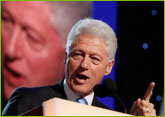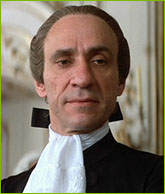August 23, 2008
 In 1919, the Chicago White Sox, one of the greatest baseball teams in American history, conspired with a series of gamblers to throw the World Series to the Cincinnati Reds. They did it for money: the owner of the Sox, Charles Comiskey, was notoriously stingy towards his players and incredibly self-righteous, and this combination proved lethal. After the fraud was uncovered and the players put on trial, according to legend, the famous White Sox outfielder “Shoeless Joe” Jackson was confronted by a child outside court. The young lad plaintively cried, “Say it ain’t so, Joe!”
In 1919, the Chicago White Sox, one of the greatest baseball teams in American history, conspired with a series of gamblers to throw the World Series to the Cincinnati Reds. They did it for money: the owner of the Sox, Charles Comiskey, was notoriously stingy towards his players and incredibly self-righteous, and this combination proved lethal. After the fraud was uncovered and the players put on trial, according to legend, the famous White Sox outfielder “Shoeless Joe” Jackson was confronted by a child outside court. The young lad plaintively cried, “Say it ain’t so, Joe!”
“Well kid,” Shoeless replied, “I’m afraid it is.”
Jump to ninety years later; now, I’m sure I’m not alone in wanting to invoke a similar phrase in a very different Chicago story. Say it ain’t Joe, Barack, say it ain’t Joe!
To merely write that I’m disappointed by this pick is an understatement of similar magnitude to saying that Usain Bolt has got a bit of acceleration. Or it’s like saying that Mozart could rattle off a tune now and then. Or it’s akin to saying that Paris Hilton is partial to boys…every once in a while.
This is a hideously bad pick; I do not expect Barack to reverse it, because to do so would entail more damage than the choice does in the first place. However, in order to move on from this decision, there needs to be honesty about Biden’s weak points and strong points.
To be absolutely fair to Biden, he has been around for quite some time; tenure does breed experience, and he probably has a deeper insight into how Washington runs than Barack does. Secondly, Biden has, as head of the Senate Foreign Relations Committee, valuable experience in foreign policy. It is also clear that Biden can be tenacious in attack when it is required.
These obvious strengths, however, do not counterbalance Biden’s just as obvious weaknesses; what is more, some of his “virtues” may actually create problems for Obama.
If there is one overriding theme to which Barack has clung, it is “change”. He is on record stating that “too often, Washington is a place where good ideas go to die”. Given this, he was the “anti-establishment” candidate; now he has just brought one of Washington’s longest serving veterans into the fold. It remains to be seen if this is a contradiction; however if Biden now embraces the message of “change”, it has the potential to look odd, given his long years in Washington. He will be asked, and perhaps rightly, as to why didn’t achieve more “change” while serving the people of Delaware.
Furthermore, like every politician, Biden has had to tack with the prevailing wind. The longer a politician serves, the more times he has had to make alterations in his positions in order to remain viable. It is a mystery as to why this has not yet turned into a liability for McCain; there is little doubt that this will become a problem for Biden.
For example, while Biden has rightly renounced his vote on the Iraq War, he did vote in favour of it in the first place, unlike Obama, who opposed it from the start; furthermore, most news sources state he is more “hawkish” than his new boss on the issue. This impression is based on a cumulative assessment of his votes and statements; this will be extremely difficult for him to throw overboard.
Beyond this, Biden has genuine negatives. We are living in an era of sound bites, and as any good politician knows, one has to exercise supreme discipline in what one says, because any statement has the potential to be interpreted by the press in a negative way. Obama could say, “I love puppies” and the press could interpret this as an attack on cat owners.
Senator Biden lacks the fundamental self-control and awareness to operate in this era. This handicap was on display back in 1988, when he campaigned for President: for one of his speeches, he borrowed a few phrases from British Labour leader Neil Kinnock. In fairness to Biden, he did credit Kinnock in most of the instances in which he used the Welshman’s words. However, he either forgot or had a slip of the tongue, and did not state the appropriate verbal footnote at one of his engagements, and this was seized upon by the press. His Presidential hopes went up in smoke shortly thereafter.
He has also apparently learned nothing since then; during his short-lived 2008 Presidential bid, Biden refered to Obama as “clean” in a manner that could have been construed as racist. While no one genuinely thinks Biden is a bigot, it did sound patronising, and it fatally damaged him once more.
Biden creates these “target rich” opportunities and cannot stop creating them; scanning the news sources this morning, whether from Britain, the United States or elsewhere, show a startling uniformity in this one aspect: Biden likes to talk. He will continue to speak, apparently, long after it is prudent. This is highly dangerous.
I can imagine the retorts from Obama’s advisors: there is talk that Biden’s Catholicism will attract Catholic voters; however, this is difficult to see, given that this is (rightly) not something he wears on his sleeve. It has been stated that he will attract blue collar voters, given his modest background and Scranton, PA origins; it is difficult to square this idea with his present lifestyle and penchant for sharp suits. All in all, the first rule of picking a Vice Presidential candidate, “do no harm” has apparently been thrown overboard for “do nothing particularly useful”.
It may be that my distance from the internal machinations associated with this decision means that I am entirely wrong: I certainly hope so. It could very well be that the relationship between Obama and Biden is so strong as to render any negatives worth bearing, and the air of solid partnership will wipe away any doubts. However, it could also be that this is one test that Barack has flunked: he could have picked a Vice Presidential candidate to appeal to the nation, or to the editorial board of the Washington Post. Picking someone like Governor Schweitzer of Montana would have been an example of the former, picking Biden smacks of the latter. Again, I hope I’m wrong. For the moment, however, I’m digesting this uneasily. That said, tomorrow, I’ll want to get a bumper sticker which reads “Obama / Biden ’08”.
 I continue to be fascinated by the progress and exploits of Kirsty Coventry, the double gold, quadruple silver and bronze medal winning swimmer from Zimbabwe. Yesterday, she returned home to what The Zimbabwe Times called a “hero’s welcome”:
I continue to be fascinated by the progress and exploits of Kirsty Coventry, the double gold, quadruple silver and bronze medal winning swimmer from Zimbabwe. Yesterday, she returned home to what The Zimbabwe Times called a “hero’s welcome”:
 Finally, Bill did the right thing. He gave a speech which was unequivocally supportive of Barack: I breathed a sigh of relief. It was also gratifying that Bill managed to surpass his wife: while she said all the right words in her address on Tuesday, it was done in such a way that one couldn’t help but think her intent was opposite to the text. For example, when she stated pride in supporting Obama, my face automatically contorted into a cynical smile. It’s a skepticism that has deep roots: the first thing that sprang to mind when I heard a gaggle of meth-heads were arrested for threatening to kill Barack was “Hillary!”. After all, she had cited the assassination of Robert Kennedy as a precedent and a reason for keeping her campaign going long after it was reasonable to do so.
Finally, Bill did the right thing. He gave a speech which was unequivocally supportive of Barack: I breathed a sigh of relief. It was also gratifying that Bill managed to surpass his wife: while she said all the right words in her address on Tuesday, it was done in such a way that one couldn’t help but think her intent was opposite to the text. For example, when she stated pride in supporting Obama, my face automatically contorted into a cynical smile. It’s a skepticism that has deep roots: the first thing that sprang to mind when I heard a gaggle of meth-heads were arrested for threatening to kill Barack was “Hillary!”. After all, she had cited the assassination of Robert Kennedy as a precedent and a reason for keeping her campaign going long after it was reasonable to do so.  The Democratic National Convention has kicked off in Denver, and apparently it’s gotten off to a brisk start. The reviews of the speeches by Michelle Obama, Senator Ted Kennedy and Nancy Pelosi suggest all have gone off without a hitch. No doubt, Michelle, Ted and Nancy breathed more easily once they got off the stage and out of the glare of the television cameras. They deserve to feel a cool, satisfied sense of relief. The convention so far has been carefully scripted, strictly managed, and well presented; the Democrats are doing their utmost to put their best foot forward, and so far have achieved almost Beijing Olympics levels of efficiency.
The Democratic National Convention has kicked off in Denver, and apparently it’s gotten off to a brisk start. The reviews of the speeches by Michelle Obama, Senator Ted Kennedy and Nancy Pelosi suggest all have gone off without a hitch. No doubt, Michelle, Ted and Nancy breathed more easily once they got off the stage and out of the glare of the television cameras. They deserve to feel a cool, satisfied sense of relief. The convention so far has been carefully scripted, strictly managed, and well presented; the Democrats are doing their utmost to put their best foot forward, and so far have achieved almost Beijing Olympics levels of efficiency. The Beijing Olympics have ended just as flamboyantly as they began. I watched the Closing Ceremonies with interest and a tinge of sadness: after all, the Games have provided the bulk of my entertainment for the past two weeks, and the success of the British athletes has provided me with a timely set of “pick me ups” just when office life was stagnating.
The Beijing Olympics have ended just as flamboyantly as they began. I watched the Closing Ceremonies with interest and a tinge of sadness: after all, the Games have provided the bulk of my entertainment for the past two weeks, and the success of the British athletes has provided me with a timely set of “pick me ups” just when office life was stagnating.  One of the lesser reported stories of 2008 has been the continuing political turmoil in Belgium. In June 2007, an election was held: for nine consecutive months afterwards, the politicians found it impossible to assemble a working coalition to govern the country. Finally, a deal was struck putting the controversial Christian Democrat leader, Yves Leterme, into the hot seat as Prime Minister.
One of the lesser reported stories of 2008 has been the continuing political turmoil in Belgium. In June 2007, an election was held: for nine consecutive months afterwards, the politicians found it impossible to assemble a working coalition to govern the country. Finally, a deal was struck putting the controversial Christian Democrat leader, Yves Leterme, into the hot seat as Prime Minister. While I and many others are trying to grasp Obama’s reasoning behind his choice of Joe Biden as a running mate, it is worth mentioning that there is a certain logic to this for fans of “The West Wing”.
While I and many others are trying to grasp Obama’s reasoning behind his choice of Joe Biden as a running mate, it is worth mentioning that there is a certain logic to this for fans of “The West Wing”.  In 1919, the Chicago White Sox, one of the greatest baseball teams in American history, conspired with a series of gamblers to throw the World Series to the Cincinnati Reds. They did it for money: the owner of the Sox, Charles Comiskey, was notoriously stingy towards his players and incredibly self-righteous, and this combination proved lethal. After the fraud was uncovered and the players put on trial, according to legend, the famous White Sox outfielder “Shoeless Joe” Jackson was confronted by a child outside court. The young lad plaintively cried, “Say it ain’t so, Joe!”
In 1919, the Chicago White Sox, one of the greatest baseball teams in American history, conspired with a series of gamblers to throw the World Series to the Cincinnati Reds. They did it for money: the owner of the Sox, Charles Comiskey, was notoriously stingy towards his players and incredibly self-righteous, and this combination proved lethal. After the fraud was uncovered and the players put on trial, according to legend, the famous White Sox outfielder “Shoeless Joe” Jackson was confronted by a child outside court. The young lad plaintively cried, “Say it ain’t so, Joe!” I am fairly glad that the end of the week is nigh, and that the following Monday is a holiday in the United Kingdom. It has been a depressing five days, and the in-built languor of summer’s end was heightened by a conversation I had with my boss on Wednesday.
I am fairly glad that the end of the week is nigh, and that the following Monday is a holiday in the United Kingdom. It has been a depressing five days, and the in-built languor of summer’s end was heightened by a conversation I had with my boss on Wednesday.  I'm a Doctor of both Creative Writing and Manufacturing and Mechanical Engineering, a novelist, a technologist, and still an amateur in much else.
I'm a Doctor of both Creative Writing and Manufacturing and Mechanical Engineering, a novelist, a technologist, and still an amateur in much else.




